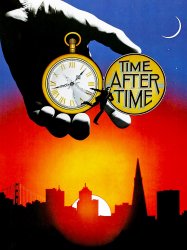The Time Machine is a american film of genre Science fiction directed by Gore Verbinski released in USA on 4 march 2002 with Guy Pearce
The Time Machine (2002)
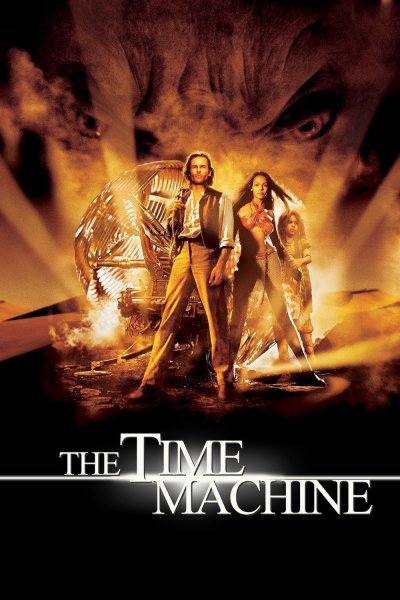
If you like this film, let us know!
Released in USA 4 march 2002
Length 1h36
OriginUSA
Themes Post-apocalyptic films, Films about religion, Time travel films, Films based on science fiction novels, Films set in the future, Political films, Dystopian films, Steampunk films, Alternate history films, Impact events in fiction, Disaster films
Rating60%










The Time Machine is a 2002 American science fiction film loosely adapted from the 1895 novel of the same name by H. G. Wells and the 1960 film screenplay by David Duncan. It was executive-produced by Arnold Leibovit and directed by Simon Wells, the great-grandson of the original author. The film stars Guy Pearce, Jeremy Irons, Orlando Jones, Samantha Mumba, Mark Addy, Sienna Guillory and Phyllida Law, and includes a cameo by Alan Young, who also appeared in the 1960 film adaptation.
The 2002 film is set in New York City instead of London and contains new story elements not present in the original novel, including a romantic backstory, a new scenario about how civilization was destroyed, and several new characters, such as an artificially intelligent hologram played by Orlando Jones and a Morlock leader played by Jeremy Irons. Director Gore Verbinski was brought in to take over the last 18 days of shooting, as Wells was suffering from "extreme exhaustion". Wells returned for post-production. It was nominated for the Academy Award for Best Makeup (John M. Elliot, Jr. and Barbara Lorenz) at the 75th Academy Awards, but lost to Frida.
Synopsis
In the year 1899, Dr. Alexander Hartdegen (Guy Pearce) is a moderately young inventor teaching at Columbia University in New York City. Unlike his conservative friend David Philby (Mark Addy), Alexander would rather do pure research than work in the world of business. After a mugger kills his fiancée, Emma, he devotes himself to building a time machine that will allow him to travel back in time and save her. When he completes the machine four years later, he travels back to 1899 and prevents her murder, only to see her killed by a horse and buggy.Actors
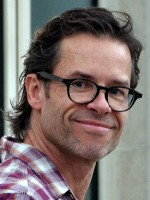
Guy Pearce
(Alexander Hartdegen)

Samantha Mumba
(Mara)
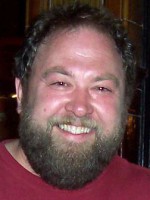
Mark Addy
(David Filby)

Sienna Guillory
(Emma)
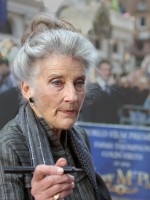
Phyllida Law
(Mrs. Watchett)
The Time Machine
Comments
Leave comment :
Suggestions of similar film to The Time Machine
There are 105 films with the same actors, 18 films with the same director, 25059 with the same cinematographic genres (including 230 with exactly the same 4 genres than The Time Machine), 12362 films with the same themes (including 0 films with the same 11 themes than The Time Machine), to have finally 70 suggestions of similar films.If you liked The Time Machine, you will probably like those similar films :
 , 2h16
, 2h16Directed by Rob Marshall, Gore Verbinski
Origin USA
Genres Fantastic, Comedy, Fantasy, Swashbuckler, Action, Adventure
Themes Films about magic and magicians, Medical-themed films, Seafaring films, Transport films, Pirate films, Mermaids in film, Zombie films, Films about viral outbreaks, Children's films, Disaster films
Actors Johnny Depp, Penélope Cruz, Ian McShane, Geoffrey Rush, Kevin McNally, Sam Claflin
Rating65%





After a failed attempt to rescue his first mate, Joshamee Gibbs, in London, Captain Jack Sparrow is brought before King George II, who wants Jack to guide an expedition to the Fountain of Youth before King Ferdinand and the Spanish Navy can locate it. Heading the expedition is Jack's old nemesis, Captain Hector Barbossa, now a privateer in service to the British Navy after losing his leg and ship, the Black Pearl, which he believes to be sunk.

Mars Needs Moms (2011)
, 1h28Directed by Simon Wells
Origin USA
Genres Science fiction, Comedy, Adventure, Animation
Themes Space adventure films, Mars in film, Comedy science fiction films, Films set in the future, Films about extraterrestrial life, Martiens, Space opera, Children's films, Films about extraterrestrial life, Alien invasions in films, Disaster films
Actors Seth Green, Dan Fogler, Elisabeth Harnois, Breckin Meyer, Mindy Sterling, Tom Everett Scott
Rating54%





Nine-year-old Milo (Seth Green, voice-over by Seth Dusky) is just beginning summer vacation, and his father (Tom Everett Scott) is leaving for a business trip. While Milo is wanting his summer to be a fun one, his mother (Joan Cusack) assigns him chores and tasks like taking out the trash. At dinnertime, Milo is given broccoli. His mother has a "no broccoli, no TV" rule which Milo cleverly evades. When Milo feeds his broccoli to his cat, his mom grounds him and sends him to bed early. After a heated argument with his mother, Milo wishes that he never had a mom. Later that night, his wish comes true when his mother is abducted by Martians who plan to steal her "momness" to rear their own young.

The Prince of Egypt (1998)
, 1h39Directed by Steve Hickner, Brenda Chapman, Simon Wells
Origin USA
Genres Drama, Comedy, Adventure, Musical, Animation
Themes Films set in Africa, Films about slavery, Films about music and musicians, Films about religion, Musical films, Films based on the Bible, Films about Jews and Judaism, Films about Islam, Children's films
Actors Val Kilmer, Ralph Fiennes, Michelle Pfeiffer, Amick Byram, Sandra Bullock, Jeff Goldblum
Rating72%





In Ancient Egypt, Yocheved and her two children, Miriam and Aaron, watch as newborn Hebrew boys are taken and ruthlessly killed as ordered by Pharaoh Seti I, who fears that an increase of Hebrew slaves could lead to rebellion. Fearing for her own newborn son's safety, Yocheved places him in a basket afloat on the Nile. Miriam follows the basket to the Pharaoh's palace and witnesses her baby brother safely adopted by Queen Tuya, who names him Moses.
 , 1h12
, 1h12Directed by Don Bluth, Phil Nibbelink, Dick Zondag, Ralph Zondag, Simon Wells
Origin USA
Genres Science fiction, Animation
Themes Films about animals, Circus films, Dinosaur films, La préhistoire, Time travel films, Animaux préhistoriques, Children's films
Actors John Goodman, Blaze Berdahl, Rhea Perlman, Felicity Ann Kendal, Charles Fleischer, Walter Cronkite
Rating60%





The film opens with a trio of young bluebirds harassing their youngest sibling, Buster (Blaze Berdahl). As Buster leaves his family, he meets an intelligent orange T. rex named Rex (John Goodman) playing golf. He explains to Buster that he was once a ravaging dinosaur, and proceeds to tell the story of how he came to become what he is today.

Resident Evil: Afterlife (2010)
, 1h37Directed by Paul W.S. Anderson
Origin USA
Genres Drama, Science fiction, Thriller, Action, Adventure, Horror
Themes Clonage, La fin du monde, Films about computing, Jeu, Medical-themed films, Seafaring films, Post-apocalyptic films, Films about religion, Transport films, Films set in the future, Zombie films, Films about video games, Films about viral outbreaks, Catastrophe épidémiologique, Political films, Dystopian films, Films based on video games, Disaster films
Actors Milla Jovovich, Ali Larter, Kim Coates, Shawn Roberts, Spencer Locke, Sienna Guillory
Rating58%





A year after the events of Extinction, the Alice clones (Milla Jovovich) attempt to kill Albert Wesker (Shawn Roberts) at the current Umbrella Headquarters, Tokyo. The clones manage to kill the entire branch, but Wesker makes his way to his private charter tiltrotor plane and escapes before activating a bomb, leaving a massive sinkhole. However, the real Alice boarded his aircraft beforehand. As she pulls a gun on him, Wesker injects her with Anti-Virus before the lack of a pilot makes the aircraft crash in the mountains outside Tokyo. Only Alice emerges from the crash alive.

Resident Evil: Retribution (2012)
, 1h35Directed by Paul W.S. Anderson
Origin German
Genres Science fiction, Thriller, Action, Adventure, Horror, Crime
Themes Clonage, La fin du monde, Films about computing, Jeu, Medical-themed films, Seafaring films, Post-apocalyptic films, Films about religion, Transport films, Films set in the future, Zombie films, Films about video games, Films about viral outbreaks, Catastrophe épidémiologique, Films about disabilities, Political films, Dystopian films, Films based on video games, Disaster films, Personne sourde ou muette
Actors Milla Jovovich, Michelle Rodríguez, Kevin Durand, Sienna Guillory, Shawn Roberts, Aryana Engineer
Rating53%





Alice (Milla Jovovich) and the others on the Umbrella Corporation freighter Arcadia face an attack by a fleet of tiltrotors led by Alice's former ally, Jill Valentine (Sienna Guillory), who is being mind controlled by Umbrella through a scarab device attached to her chest. Alice causes a tiltrotor to crash into Arcadia, resulting in an explosion that knocks her out and into the water. The fates of Chris Redfield, Claire Redfield and K-Mart are ambiguous.

Resident Evil: Apocalypse (2004)
, 1h33Directed by Alexander Witt
Origin German
Genres Science fiction, Thriller, Fantastic, Action, Horror
Themes Films about children, La fin du monde, Films about computing, Jeu, Medical-themed films, Post-apocalyptic films, Films about religion, Films set in the future, Zombie films, Films about video games, Films about viral outbreaks, Catastrophe épidémiologique, Political films, Dystopian films, Films based on video games, Disaster films
Actors Milla Jovovich, Sienna Guillory, Oded Fehr, Thomas Kretschmann, Jared Harris, Matthew G. Taylor
Rating61%





30 days after the contamination of The Hive seen in Resident Evil (2002), the Umbrella Corporation unwisely sends in a research team to re-open the complex and investigate the incident, since no one survived except Alice and Matt Addison, and as Alice was experimented on, Matt was put into a mysterious "Nemesis Program". When the team reprograms and opens the sealed blast doors, they are slaughtered by the massive crowd of infected.

The Time Machine (1960)
, 1h43Directed by George Pal
Origin USA
Genres Science fiction, Thriller, Fantasy, Adventure, Romance
Themes Post-apocalyptic films, Films about religion, Time travel films, Films based on science fiction novels, Films set in the future, Political films, Dystopian films, Disaster films
Actors Rod Taylor, Alan Young, Yvette Mimieux, Sebastian Cabot, Whit Bissell, Tom Helmore
Rating74%





On January 5, 1900, four friends arrive for a dinner at the house of H. George Wells (Rod Taylor), an inventor. Their host is late and his housekeeper, Mrs. Watchet, has served dinner in his absence. Bedraggled and exhausted, George staggers in. He takes brief refreshment and begins to describe the strange experiences he has had since the last time the group met.
 , 1h46
, 1h46Directed by Paul W.S. Anderson
Origin German
Genres Science fiction, Thriller, Action, Adventure, Horror
Themes Clonage, Films about computing, Jeu, Medical-themed films, Post-apocalyptic films, Films set in the future, Zombie films, Films about video games, Films about viral outbreaks, Political films, Dystopian films, Films based on video games, Disaster films
Actors Milla Jovovich, Wentworth Miller, Ali Larter, Sienna Guillory, Iain Glen, Li Bingbing (李冰冰)
Rating55%





Picking up immediately after the events in Resident Evil: Retribution, humanity is on its last legs after Alice is betrayed by Wesker in Washington D.C. As the only survivor of what was meant to be humanity's final stand against the undead hordes, Alice returns to where the nightmare began, Raccoon City, where the Umbrella Corporation is gathering its forces for a final strike against the only remaining survivors of the apocalypse. In a race against time, Alice joins forces with old friends, and an unlikely ally, in a battle with undead hordes and new mutant monsters. Between losing her superhuman abilities and Umbrella's impending attack, this will be Alice's most difficult adventure as she fights to save humanity.

The Road (2009)
, 1h51Directed by John Hillcoat
Origin USA
Genres Drama, Science fiction, Thriller, Social science fiction, Adventure, Apocalyptic and post-apocalyptic fiction
Themes Post-apocalyptic films, Films about religion, Transport films, Films about automobiles, Films based on science fiction novels, Films set in the future, Political films, Road movies, Dystopian films, Disaster films
Actors Viggo Mortensen, Kodi Smit-McPhee, Robert Duvall, Charlize Theron, Guy Pearce, Molly Parker
Rating71%





A man and his young son struggle to survive after an unspecified cataclysm has caused another extinction event. Civilization has collapsed, reducing the survivors to scavenging and in most cases cannibalism. The duo search for supplies as they travel south on a road to the coast in the hope it will be warmer. The man is armed with a revolver, but carries just two rounds.
 Connection
Connection

